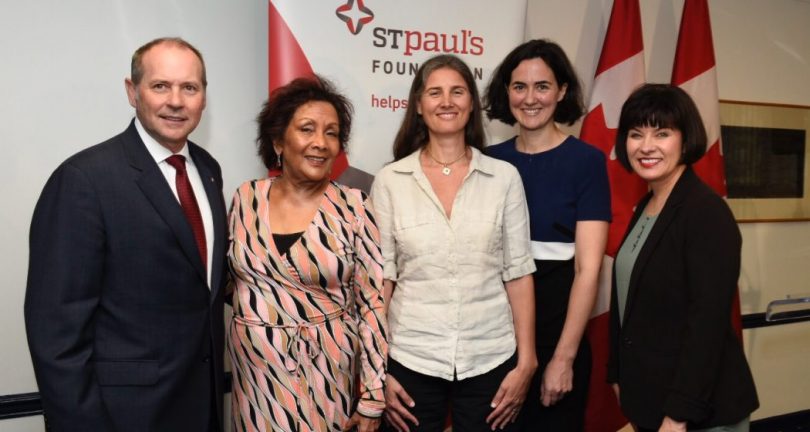This story originally appeared on the St. Paul’s Foundation website.
The opioid crisis continues to be one of the most serious public health issues in Canada’s recent history. Between January 2016 and September 2018 more than 10,300 Canadians died from an apparent opioid-related overdose.
On April 24th, Honourable Ginette Petitpas Taylor, Minister of Health, announced funding for new initiatives to increase knowledge among BC health practitioners about opioid use and treatment, decrease harms associated with opioid use, and enhance access to evidence-based treatment.
“This crisis continues to be one of the most serious public health issues in Canada’s recent history, and organizations on the ground can help us turn the tide of it. That’s why we are investing further in them. We know there is no silver bullet solution to this crisis, and the services and education these organizations offer is crucial. We must continue to work all together to save lives,” said Petitpas Taylor.
Minister Petitpas Taylor made the announcement while meeting with representatives of St. Paul’s Foundation, and taking a tour of the Rapid Access Addiction Clinic (RAAC) at St. Paul’s Hospital. The RAAC, supported by Foundation funding, is designed to connect patients seeking treatment for substance use disorders with evidence-based treatment in order to stabilize the patient in the short term, and subsequently transfer them to a community care provider for ongoing monitoring, support and rehabilitation.
Breaking down barriers, learning from the experiences of others, and promoting empathy is so important. I was humbled today to meet with people at the forefront of the response to the #opioidcrisis. Proud to support their incredibly important work. https://t.co/c3HI6aaJPx pic.twitter.com/2VmhV5H4p1
— Min. Petitpas Taylor (@CDNMinHealth) April 25, 2019
Through an investment of $9.6 million, seven new projects funded through the Substance Use and Addictions Program (SUAP) will focus on education and sharing information on effective treatments for opioid use disorder. More than $900,000 of this funding will be received by St. Paul’s Foundation to support the British Columbia Centre on Substance Use (BCCSU) to develop a BC-Yukon opioid agonist treatment (OAT) Provider Network.
Opioid use disorder is recognized as one of the most challenging forms of addiction facing Canadian health care systems and, untreated, has been major driver of the dramatic rise in overdose deaths across the nation. Unfortunately, the health system lacks the knowledge and use of evidence-based treatment options in order to improve access to addiction medicine education. The BC-Yukon OAT Provider Network will function as a virtual community of practice, and will support knowledge exchange, mobilization, and implementation of evidence-based approaches and interventions in health care along the continuum of opioid use disorder care.
St. Paul’s Hospital happens to sit at the epicentre of the crisis in Vancouver and provides care to one of our country’s most vulnerable populations. We know that research, outreach, and education will significantly reduce harm, yield financial savings and, most importantly, improve and save the lives of individuals, families, and communities affected by addiction across Canada. There is much to do. And with this exciting announcement, we will take one more step in the right direction,” said Dick Vollet, President and CEO, St. Paul’s Foundation.
The #opioidcrisis has had a profound impacts in #BC and across the country. Increasing knowledge and improving treatment are crucial parts of the solution. Learn how new initiatives in BC will help respond to the crisis and save lives: https://t.co/n9CnqEN2xW pic.twitter.com/roqM6ayfpn
— Min. Petitpas Taylor (@CDNMinHealth) April 25, 2019





